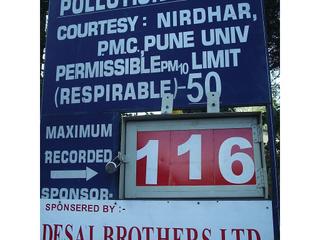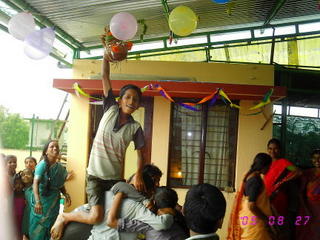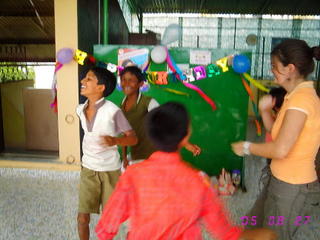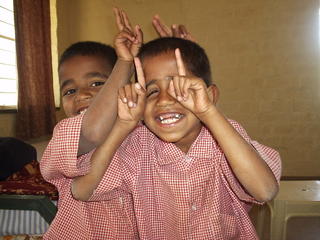This last week has been a week of beautiful people. There has been ugliness too. Mirror-shattering ugliness. But, the beautiful people have made it ok in their own beautiful people way… like they always do.
Neville and Errol work for Sahara.
What is Sahara? Burnt sands, side-winding snakes, mirages?
It is an organisation based in Delhi that runs care homes across India for those who have no one and nowhere. Their Pune care home almost closed down earlier this year. They had forgotten to care, to touch, to hold the dying. Neville, a director at Sahara, with greying medusan locks, wiry frame and dark lips that sucked on short stubby cigarettes, sent Errol, his leather pants, and three other beautiful people, Babloo amongst them, to remind Pune of what they had forgotten.
Errol loved
Usha. He called her his sweetheart. She loved him. It was easy. He is special. His team is special. They cup their gloved hands to catch the blood – HIV wasting disease does that. I watched as lips looked like they came loose and flowed into Babloo’s waiting hands. I watched the mess of blood smile through the pain.
They cup their naked beings to catch hope and peace. HIV erodes those too.
I had been warned. Do not send your clients to Sahara. It is finished. They have lost their way. Little voices murmured in my ear, little voices that belonged to Lata and Maya, my HIV+ counsellor and care supervisor. (Two of the most beautiful people alive. They are two of my dancing stars… and the stars dance in their eyes.)
“Sir, there is a team coming from Delhi. Sahara is where we should send our clients.”
I trust Lata and Maya. (I have been told that I trust them too much. You can never trust too much. Similarly, how does one trust a little? You either trust or you don’t trust. To quantify trust is nonsense. If you can, then you can quantify pregnancy… you can quantify being HIV+…) We sent them Usha, Sanjay and his wife, Mala. The week Usha died I visited Sahara to thank them for all they did for her. Right down to expertly mummifying her broken body. Errol’s electric blue fishnet t-shirt, gold eyebrow piercing and mobile phone hanging from his belt in a holster like a six-gun of old, startled me. His team’s commitment humbled me. They have no beds, no recreation, no privacy. They are always on call.
Ex-drug addicts all - needles and abbesses and life scarred their frail bodies and their tired eyes. Their smiles were unapologetic and defiant.
“We were treated like bloody dirt by some doctors. Today, with no medical degrees we do what doctors never dare to do, we touch people that doctors look upon with revulsion.”
Errol is eloquent. English is his mother tongue. He speaks a smattering of Hindi, and Tamil, the language of his hometown Madras, is alien. When I met with Errol and Neville, there was a Keith there too, with a glorious mullet and concerned eyes and Venkat, their finance officer with a big grin under his big moustache. We laughed, smoked, planned. We looked to the future - Sahara and DISHA - a future of caring for the forgotten, the nowhere men and women.
The song by the Beatles has resonance with me… still.
The nowhere man, sitting in his nowhere land, making all his nowhere plans for nobody…
I’ve felt like this in my darker moments – which are few. Futility oppresses me and takes me to a place that I would not let me go. It is the beautiful people that bring me back. It is the beautiful people that force me to look at life, to smell it, to touch it, to listen to its rhythm.
It is the beautiful people that remind me that life is a dance. My own mantra, that so often forsakes me… no, I forsake my mantra. It is the dancing stars that remind me. They awaken me again and again to the Dionysian chaos of life, the rhythm. They make me bite; life stains my teeth, my tongue…life’s delectable juice trickles down my chin. It tastes real.
That night at the Shisha café, Errol, drunk and lost in the music swayed to Lennon’s Imagine. (Neville had shared my concern of burnout. Errol must be protected from himself.) I watched him as he drifted away, eyes closed, smiling. What this most beautiful of men imagined I would never know, but his journey thus far had taken courage, strength not of his own – his claim, not mine. And I suspect that he knew, like I do, that for the path ahead, which will often grow dark, more courage still, will be our light.
And so we dance, we dance with those we care for until they dance no more. And still we dance - for them, always for them… but also for us. We have to, we must, it renews us. We are born again.
The dance is joyful, it is full of wonder at life, and it pulsates with the reality of pain, of suffering. Beautiful people like Errol do not deny the pain or the suffering, they embrace it, they overcome it… with the knowledge that it will return, again and again. But here’s what’s wonderful, the joy will return too.
Beautiful people don’t just imagine. They know, they live, they dance…





